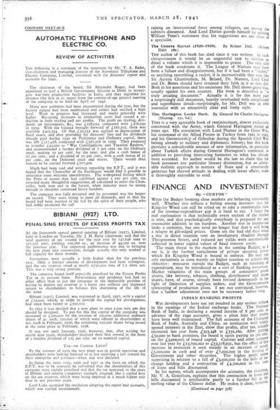BIBIAN1 (1927) LTD.
PENALSING EFFECTS OF EXCESS PROFITS TAX
AT the fourteenth annual general meeting of Bibiani (1927), Limited, held in London on Tuesday, Mr. J. H. Batty (chairman) said that the total quantity of ore treated for the year rose by 147,648 tons to 321,550 tons, yielding 100,768 oz., an increase of 44,529 oz. over the previous year. The improved performance was due to bringing the new plant into commission, though actually this only worked at full capacity for three months.
Extractions were actually a little higher than for the previous year. Only a limited amount of development had been attempted, and the ore reserves stood at nearly 2,750,000 tons of 7.2 dwts. ore. This was a very strong position.
The company found itself especially penalised by the Excess Profits Tax in its present form. Perseverance and prudence had had no other effect than to put the company in the deplorable position of having to deplete ore reserves at a faster rate without any increased return to shareholders to balance this shortening of the life of the mine.
Bibiani (1927), Limited, was registered in April2 1927, with a capital of £12,000, which, in order to provide the capital for development, had since been raised to £50o,000.
In 1935 it was decided that a new plant to treat r,000 tons per day should be designed. To pay for this the capital of the company was increased to £500,000 by the creation of 300,000 additional ordinary shares of 4s. each, 250,000 of which were offered to shareholders at 2os. each in February, 1936, the remaining 250,000 shares being issued at the same price in February, 1938.
It was not until January, 1936, however, that, after waiting for nearly nine years, shareholders-received their first reward in the form
• of a maiden dividend of 124 per cent. on its nominal capital.
TAX—OR CAPITAL LEVY?.
By the summer of 1939 the new plant was in partial operation and shareholders were looking forward to at last receiving a just reward for their enterprise and patience—when war was 'declared.
In fixing the years 1935, 1936 and 1937 as the basis on which the E.P.T. was to be assessed, he submitted that the shareholders of this company were unduly penalised and that the tax operated, in the cases of Bibiani and mining companies similarly situated, like a capital levy on the ore reserves, which were being depleted at a much higher rate than in any previous years.
Lord Luke seconded the resolution adopting the reporilind accounts, which was carried unanimously.






























 Previous page
Previous page